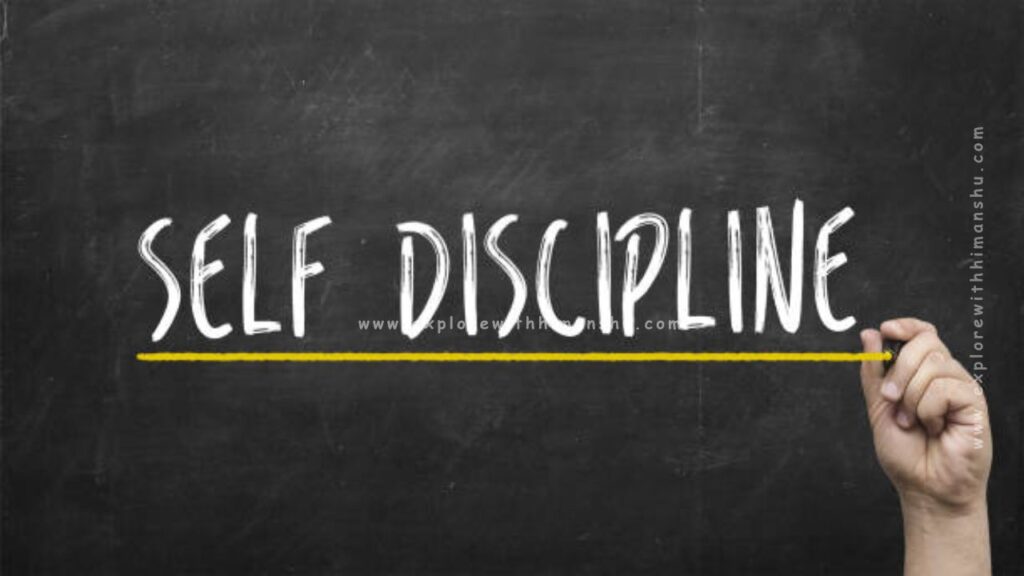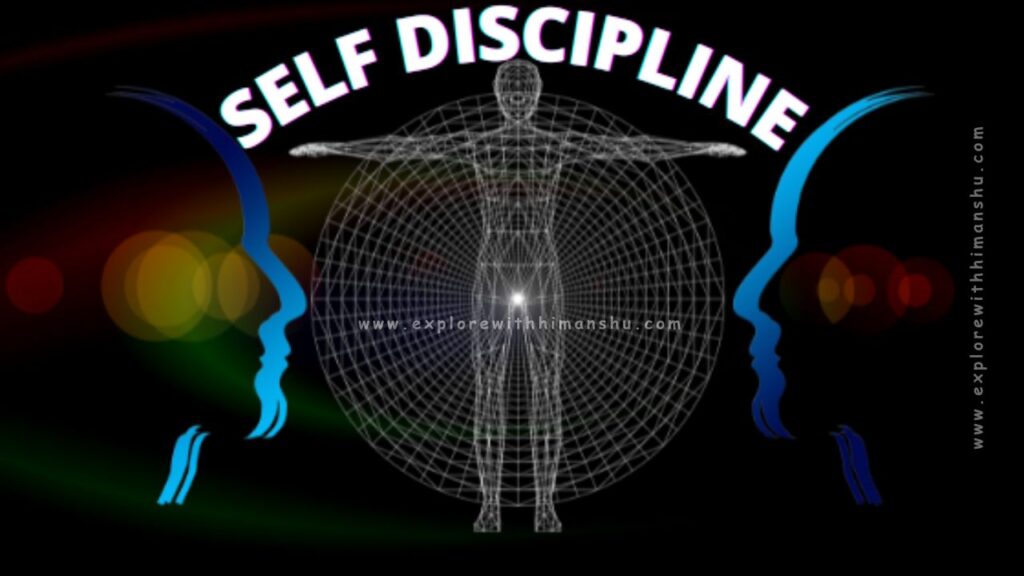Introduction ;-
Self discipline is the bridge among dreams and accomplishments. Whether you purpose to increase your profession, improve your health, or enhance your personal growth, mastering strength of mind is essential. It is the ability to control feelings, behaviors, and desires to achieve a selected aim despite obstacles. In these day’s rapid-paced world, distractions are everywhere, making self discipline extra crucial than ever.
Discover the science behind self discipline, practical techniques, and real-life case studies to build habits that lead to long-term success.
In this comprehensive guide, we will explore the science behind self-discipline, real-life case studies of highly disciplined individuals, and practical techniques to cultivate self-control in different areas of life. By the end of this article, you will have a deep understanding of how self-discipline can transform your life and the steps needed to develop it effectively.

The Science Behind Self Discipline
1. The Role of the Brain in Self-Discipline
Self-discipline is deeply rooted in neuroscience. The prefrontal cortex, the part of the brain responsible for decision-making and impulse control, plays a crucial role in self-discipline. Studies show that individuals with a well-developed prefrontal cortex tend to exhibit higher levels of self-control.
One of the most famous studies on self-discipline is the Marshmallow Experiment conducted by psychologist Walter Mischel in the 1960s. The study revealed that children who resisted eating a marshmallow for a bigger reward later in life achieved greater success in academic performance, career growth, and personal well-being.
2. The Habit Loop and Self-Discipline
Self-discipline is also linked to habit formation. Charles Duhigg, in his book The Power of Habit, explains the habit loop: cue, routine, and reward. When a behavior becomes habitual, it requires less effort and willpower to sustain.
For example, waking up early for a workout can be challenging initially, but once it becomes a habit, the brain requires less conscious effort to execute it daily.
The Role of Technology in Enhancing Self Discipline
Apps for Self-Discipline:
- Forest: Helps with focus by growing a virtual tree when you stay off your phone.
- Rescue Time: Tracks time spent on different activities to improve productivity.
- Noisli: Provides background sounds to enhance concentration.
Using AI for Accountability:
- AI-based coaching platforms like Replika provide daily motivation and habit-tracking features.
- Smartwatches remind users to stay active and avoid distractions.
Case Studies: Highly Disciplined Individuals
1. Elon Musk: Extreme Work Ethic
Elon Musk, CEO of Tesla and SpaceX, is known for his relentless work ethic. His disciplined approach to time management allows him to work up to 100 hours per week, ensuring he stays ahead in technological advancements. His strict routine, clear priorities, and avoidance of distractions contribute to his success.
2. Jocko Will ink: The Power of Waking Up Early
Jocko Will ink, a retired Navy SEAL, preaches the benefits of waking up early. He wakes up at 4:30 AM daily to exercise, plan his day, and develop mental resilience. His philosophy, Discipline Equals Freedom, highlights how self-discipline leads to control over one’s life.
3. Oprah Winfrey: The Role of Daily Routines
Oprah Winfrey attributes her success to daily disciplined habits like meditation, reading, and exercise. She follows a strict schedule to maintain productivity and personal growth.

Practical Techniques to Develop Self Discipline
1. Goal Setting and Planning
- Set SMART (Specific, Measurable, Achievable, Relevant, Time-bound) goals.
- Break down large goals into smaller, manageable tasks.
- Create a daily or weekly plan to track progress.
2. Time Management Strategies
- Use the Pomodoro Technique (work for 25 minutes, take a 5-minute break).
- Prioritize tasks using the Eisenhower Matrix (urgent vs. important).
- Limit distractions by using website blockers or setting phone limits.
3. Building Healthy Habits
- Replace bad habits with good ones using the habit-stacking technique.
- Implement a morning routine to start the day with discipline.
- Maintain consistency by tracking habits with apps like Habitica or Streaks.
4. Developing Mental Resilience
- Practice meditation and mindfulness to improve focus.
- Use affirmations and visualization to strengthen discipline.
- Learn to embrace failure as a learning opportunity.
Overcoming Challenges in Self Discipline
1. Procrastination and Laziness
- Identify the root cause (fear, boredom, lack of motivation).
- Use the 2-Minute Rule: Start with a small task to build momentum.
- Eliminate distractions by creating a focused workspace.
2. Emotional Control
- Practice emotional intelligence to manage impulses.
- Use techniques like deep breathing to reduce stress.
- Avoid negative self-talk and replace it with positive reinforcement.
3. Staying Motivated
- Reward yourself for completing tasks.
- Surround yourself with disciplined and motivated individuals.
- Keep a discipline journal to reflect on progress.

Self Discipline in Different Areas of Life
1. Health and Fitness
- Follow a strict workout routine.
- Maintain a balanced diet and avoid unhealthy foods.
- Get adequate sleep to enhance cognitive functions.
The Best Fitness Apps to Achieve Your Health Goals in 2025
2. Career and Productivity
- Set professional goals and work diligently towards them.
- Avoid workplace distractions and manage time effectively.
- Continuously seek learning opportunities.
3. Personal Finance
- Develop a habit of saving and investing.
- Avoid impulsive spending.
- Stick to a budget and track expenses.
4. Relationships and Social Life
- Practice self-control in conflicts.
- Maintain healthy boundaries.
- Prioritize meaningful relationships over superficial connections.
Conclusion – Mastering Self Discipline
Self-discipline is not a talent; it is a skill that can be cultivated through consistent effort and dedication. From understanding the science behind self-control to implementing practical techniques, mastering self-discipline requires a conscious effort to break bad habits, build positive routines, and stay focused on long-term goals.
Highly disciplined individuals like Elon Musk, Jocko Will ink, and Oprah Winfrey prove that success is not just about intelligence or luck it’s about discipline. Whether in health, career, finance, or relationships, self-discipline is the foundation for personal and professional success.
By setting clear goals, managing time effectively, and practicing resilience, you can unlock your full potential. Start small, stay consistent, and watch how discipline transforms your life.
Achieving strength of will calls for dedication, endurance, and self-recognition. Developing structured exercises, setting clean desires, and utilising generation for duty can notably enhance one’s capability to stay on target. Moreover, learning from the studies of fairly disciplined individuals like Elon Musk, David Goggins, and J.K. Rowling reinforces the concept that determination and perseverance yield tremendous consequences.
The journey to mastering self discipline is ongoing, but every small step taken strengthens the ability to make better choices and remain consistent in pursuit of goals. It is through discipline that we unlock our true potential, pushing ourselves beyond perceived limits to create a life of purpose, achievement, and fulfillment
Are you ready to take control of your future? The journey to self-discipline starts today!


